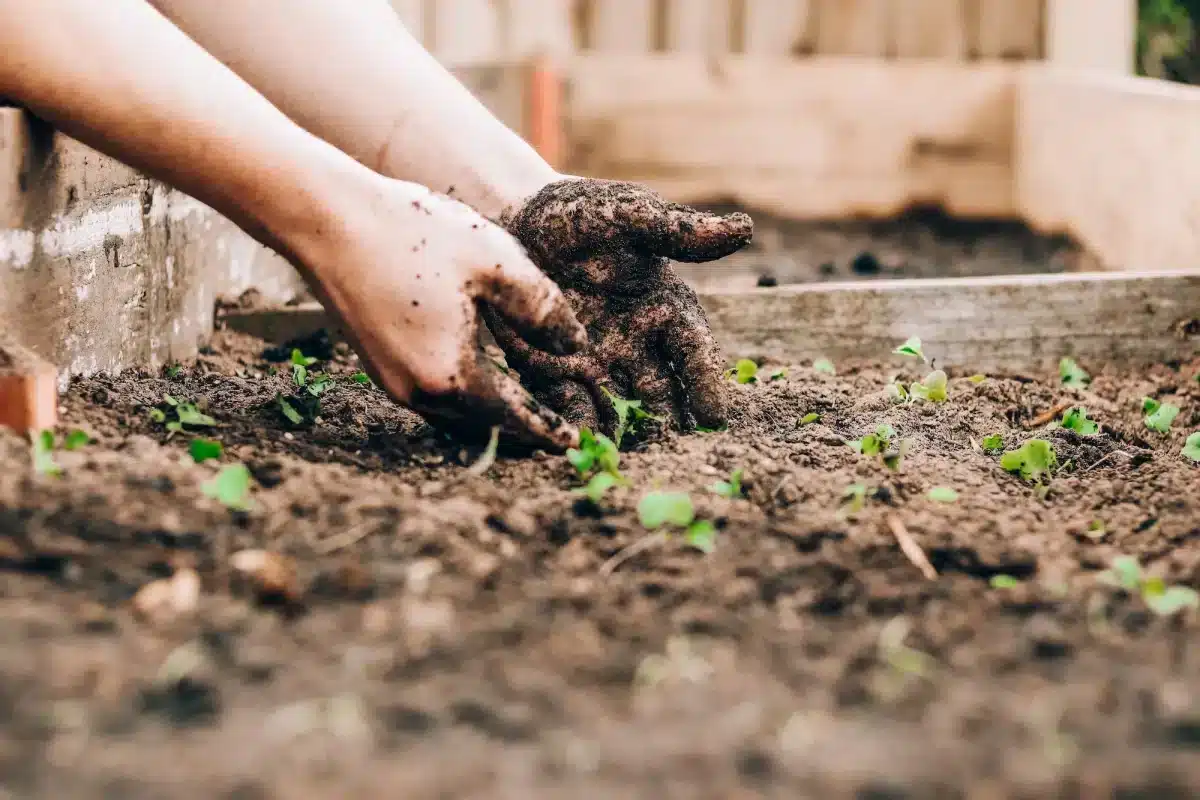An interview with Dr. Zach Bush linking health, agriculture, and human survival
Dr. Zach Bush is a certified American triple-board physician focusing on internal medicine, endocrinology, and hospice and palliative care. He currently runs a rural Virginia clinic focusing on plant-based nutrition and holistic health. Dr. Bush was recently interviewed on Acres U.S.A’s ‘Tractor Time’ podcast. In this blog post, we reveal the thoughts of one of the most compelling medical minds working to improve human health today. Spoiler alert: how soil affects human health.
You may be wondering: why are we featuring a medical doctor on a blog about agriculture? The reason is that human health is inextricably linked to what we eat, and what we eat is determined by the agricultural system, as Dr. Bush discovered. Read more about how soil affects human health.
Chronic levels of chronic disease
“When you lose reproduction and raise the chronic disease and disorder to the levels that we’ve seen today, let alone where we’re heading, it’s clear that we are near the end of our species record on earth.”
– Dr. Zach Bush
Over the last 40 years, human health has taken a turn for the worse. In America, one in three adults is obese, and we’re seeing an explosion of prediabetes worldwide. In the States, recent insurance surveys show that 52% of children under 18 have some sort of chronic disease or disorder; this can be compared to 4% of the total population in the 1960s. On top of this, sperm counts have dropped by 52% over the last 40 years.
There’s no doubt that these statistics are alarming. But what is causing these high levels of chronic disease and disorder? And what can be done about it?
Exploring a new treatment for chronic human health conditions
After spending much of his medical career prescribing specific drugs for specific symptoms, Dr. Bush found himself wondering if there wasn’t a more holistic solution out there to treat chronic health conditions. He decided to expand his viewpoints and perspectives to include what he calls the “extraordinary resources within the nutrition world”.

Dr. Bush explored the capacity of nutrients to act as a safe and non-toxic approach to cancer management, as well as the ability of dietary changes to reverse diabetes and auto-immune diseases. In 2010, he started a new clinic to teach people about nutrition and break their dependence on the pharmaceutical model that had been handed to them.
“Many of these families coming from third- and fifth-generation poverty were showing me an incredible capacity to come out of chronic disease and their huge burden of cost to the pharmaceutical dependence and find this kind of independence through food and through growing food for their health and communities. It was a really invigorating time for me to realise that as deficient as I had felt as a physician with a toolbox of drugs, I was finding myself feeling really equipped and well-prepared to change people’s lives through the story of nutrition.”
And failing to improve with food alone…
However, over time, Dr. Bush began noticing that nutrition-based medicine at his clinic just wasn’t working as he had expected. In fact, some of his patients were just getting sicker. His observations led him on a journey to find out more about a dysfunctional and toxic agricultural system, and how the use of chemicals like glyphosate is:
- Robbing crops of nutritional value
- Accelerating the decline of human health
- Destroying the environment
- Paving the way for mass extinction
“Within minutes of researching nutrient density in vegetables and fruit, you realise that we’re dealing with ten times less, sometimes 100 times less, in terms of nutrient density in our fruits and vegetables today than we had just 25 years ago.”
Despite his efforts to promote healthier diets among his patients, Dr. Bush soon realised that it was the quality of the food that was an issue.
Does food have the power to heal? It depends.
When he first started his clinic in 2010, Dr. Bush was convinced that the science backed up his beliefs about the potential healing properties of food: “I was reading some of the best science about plant medicine out there. There has been this track record of 30 years of data around plants, so I just set out and assumed that it must all be true and started applying that to my patients in a pretty aggressive form. I was forcing my patients with chronic diseases in severe forms to juice as much as two pounds of kale a day. I was going all out to get nutrient density and nutrient impact on their bodies. But there was a full third of patients that were actually getting worse, not better, on those kinds of regimens.”
Although Dr. Bush’s patients were kale-juicing, going through a wholefood, plant-based approach, “I unknowingly was exposing them to high amounts of chemicals. I didn’t know that I needed to demand of them to eat organic.”
This realisation led Dr. Bush to question what could be missing from the food, or what is now in the food, that wasn’t there in the 70s and 80s when all the science debuted. With soil health as the foundation of nutrient density in plants, Dr. Bush started to dive into soil science, and he and his team found a whitepaper that found a molecule that looked a lot like the chemotherapy he used to develop.
Dr. Bush exclaimed: “Oh my gosh, what if there was medicine in soil? And how could we translate that into a medicinal quality within the plant and impact human biology?”
Health from the ground up

Dr. Bush said: “That started a closed loop of some of the correlations we had made in science, which were showing us that we could start to predict which type of cancer a human could get from the changes in the microbiome in the soil and in their gut.”
And what is one of the main inputs changing the microbiome in the soil (and thus in the gut)? What Dr. Bush calls “Public Enemy Number 1”: Glyphosate – the herbicide that was brought to market for agricultural use in 1974 under the trade name Roundup.
How did today’s flawed food system come about?

Modern agriculture has become more and more co-dependant on chemical inputs because these chemicals cause a depletion in the soil at every stage. “Typically, the farmer will spray Roundup the day before or the week before to kill the cover crop or the weeds, and then they go and plough in the seed. And so they are destroying the ecosystem on every level, then dropping in a toxin-coated seed. And that’s the beginning of that plant’s life cycle,” Dr. Bush said.
To make matters worse, glyphosate is not just found in the agricultural sector. It’s used by municipalities to spray under power lines and alongside highways. Utility companies use it, schools use it; people even use it in their gardens. And non-agricultural glyphosate applications can be even more concerning, as non-farmers may not be as aware of the required concentrations and impact of the chemical. Dr. Bush calls this widespread use the “creep of toxicity”.
What’s the impact of glyphosate on human health?
In the soil, glyphosate kills the natural microbiome, which diminishes the nutrient availability for plants. It also destroys membranes and disrupts cell communication. When we eat food grown with glyphosate, its water-soluble toxins get into the structure of our bodies and stay in our circulation, thus affecting all areas. “It’s infiltrated into our bodies, into our natural environment, and now we are suffering from that,” said Dr. Bush.
Dr. Bush says that there’s a direct correlation between the rise in chronic diseases and the debut of genetically modified crops that we’ve been allowed and capable of spraying directly with Roundup and glyphosate. “On the autism side, the numbers are truly spectacular. We’ve gone from one in 500 children with autism in 1975 (basically the year that we debuted Roundup) to today, where we see one in 36 children with autism. That is a crushing rate of growth. Autism is a syndrome born out of the perfect storm of the destruction of the terrain of normal biology. The terrain begins not in the human cell, but in the microbiome, the bacteria, the fungi, parasites, viruses, all of these extraordinarily complex ecosystems of microbial life that build not just our gut, but our sinuses and respiratory systems, our skin. And now we’re finding that it’s even in our internal organs.”
How are these chemicals still allowed in our systems?
With science backing the belief that chemical inputs are making us sick, how are these chemicals still allowed? The answer lies in flawed, outdated and limited testing of causality. Dr. Bush gives the example of Monsanto showing that glyphosate is not carcinogenic, but the testing they use is based on a very old belief system about what carcinogenesis is. “We used to believe that cancer is caused by a series of genetic injuries. We’ve thus shown the safety of compounds by their ability to damage DNA in the cell. Now, we’re starting to realise that the cause of cancer is a shift in the extracellular environment around the cell that destroys its ability to repair the DNA. Glyphosate takes away all of the repairing mechanisms, and then injured DNA accumulates. But if you inject glyphosate into a cell, you can’t show direct DNA damage, and so Monsanto was able to hide behind this erroneous paradigm or presumptions about what cancer-causing is.”
What can be done to future-fit our food system?
Dr. Bush said that it’s imperative that farms are weaned off chemical inputs and become stewards of diverse, ecological, healthy ecosystems: “We have to change it in eight years. If we haven’t reversed the pattern in eight years, then we reach a tipping point on the planet.”
However, there is hope, if farmers take steps to become more sustainable: “If you allow that whole ecosystem back in, you eliminate 90% of the cost of being a farmer. You are no longer doing the inputs. You’re no longer paying out all the diesel cost. You’re dropping out your inputs and you’re allowing nature to create the capacity for soil vitality. The fascinating thing that we keep showing in our soil product development is that you have a healthy soil, you have a healthy root system that grows within that. If you have a healthy root system, the immune system of the plant is extraordinary.”
Soil health and regenerative agriculture to the rescue
 In essence, Dr. Bush believes that regenerative agriculture can save the world by creating healthy soils that will sequester carbon, reverse climate change, produce highly nutritious food and create healthy humans. This philosophy is shared by many prominent individuals active in the agricultural market, including Graeme Sait, CEO of Nutri-Tech Solutions (Australia), which is represented in South Africa by Zylem.
In essence, Dr. Bush believes that regenerative agriculture can save the world by creating healthy soils that will sequester carbon, reverse climate change, produce highly nutritious food and create healthy humans. This philosophy is shared by many prominent individuals active in the agricultural market, including Graeme Sait, CEO of Nutri-Tech Solutions (Australia), which is represented in South Africa by Zylem.
The role of soil health in human health
Dr. Bush believes that the health of our soil microbiome is the single most potent factor determining how healthy, or unhealthy we are. At Zylem, we know that soil health is the foundation for healthy plants that create healthy food to promote healthier humans. Contact us today to find out more about our products and services that promote soil health and sustainable agriculture.
Interested in listening to the full podcast?
Search for “Tractor Time Episode 37: Dr. Zach Bush on Farming, Glyphosate and Human Health” wherever you get your podcasts.

About the Author: Alex Platt
Alex is Business Development Manager at Zylem. He’s inspired by the potential of regenerative farming and takes a special interest in the technology and products that are moving agriculture in a more sustainable direction.

